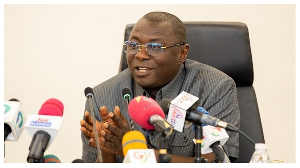Every Child Ministries (ECM), a non-denominational Christian organization, said they will liberate about 126 women serving as Trokosi in the Sovigbedor Shrine in Aflao by the end of the year.
Trokosi is a slavery-like practice of Ewes especially those in the southern of the Volta region in which women are required to become property of the god or gods of a fetish shrine in order to atone for a families' prior wrongdoing or to appeal for relief from natural misfortune such as famine or disease. The practice was outlawed by the government in 1998, but many shrines still practice Trokosi.
"We go to communities where they have Trokosi shrines, where they are dehumanizing women. We talk with leaders, we negotiation and when they agree, we see how we can help," ECM regional director for the Volta Region Christopher Vigbedor said.
In order to arrange for the women's release, ECMwill need to pay a package fee of an unspecified amount to the shrine. In addition, ECM estimates it costs $200 (US) to liberate about five Trokosi or one Trokosi woman and her children.
"They take the money and allow the girls to go. Then we see how we can rehabilitate them," Vigbedor said.
ECM said there are at least 2,200 girls and women bound to fetish shrines as Trokosi, but this number does not include their children. ECM has participated in several Trokosi liberations over the last three years, including the liberation of about 200 women in 2003 and 120 women in 2004. This will be the first liberation ECM will initiate on its own.
The Indiana, USA-based organization began arranging for the liberation in January 2005. Over the last two weeks, workers from Every Child Ministries have set up a registration base outside the Paramount Chief of Aflao's palace. So far they have registered at least 45 women.
"It's taken a lot of time to talk with the chief and priest to get them to agree to let us come here for registration," Vigbedor said.
According to ECM's Website, the organization currently works in Accra, the Eastern Region, and the Volta Region, and is planning to begin operating in the Northern Region in 2006.
Unlike other shrines, where an outsider can gain access to the ceremonies and rituals with the Chief's permission and an offering of a bottle of gin, the Sovigbedor fetish shrine is only accessible to the women living inside, the shrine priest and the Paramount Chief.
The observer can only see the drab, gray wall and listen to rumours of what is happening behind it.
The Paramount Chief, Torgbui Amenya Fiti V, explained that the women are kept hidden from the world because they are not allowed to wear clothes and there have been occasions in which peeping toms have spied on the naked women. They don't shave, comb their hair or even cut their nails, he said.
According to Vigbedor, during the Trokosi registration "One was even weeping, telling us what they've been going through."
The Paramount Chief said the Trokosi who sometimes spending more than 5 years in the shrine also face social problems upon their release. Some women were in school or married when they required to enter the shrine and are not allowed to continue their education or visit their spouses.
Most often when school-going girls serve in the shrine they are unable to continue because after serving they are too old to continue from where they left off. Also, those who are married finish serving only to see that their husbands have remarried because they could not wait, the Paramount Chief said.
Torgbui Fiti says he has already been negotiating with the shrine priest to allow the Trokosi to learn vocational skills while in service, such as weaving and other crafts, and to allow them to cover their bodies.
The families of the Trokosi are expected to pay the bills for up keep after the woman is released, but often times the shrines run out of funds during the service period and this results in cutbacks in food for the Trokosi.
General News of Wednesday, 17 August 2005
Source: Ghanaian Chronicle
















